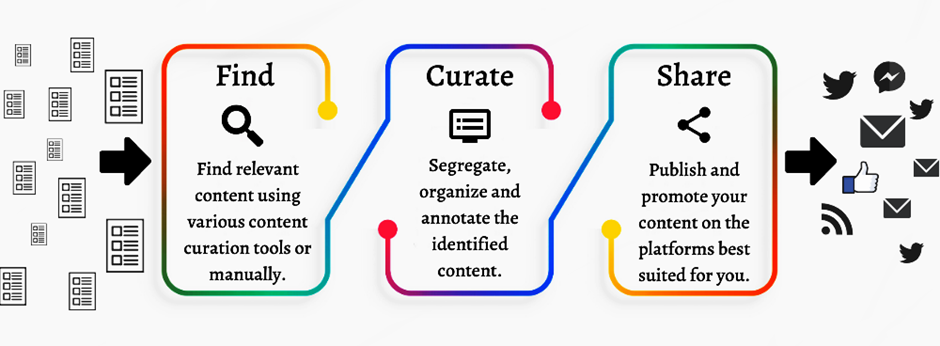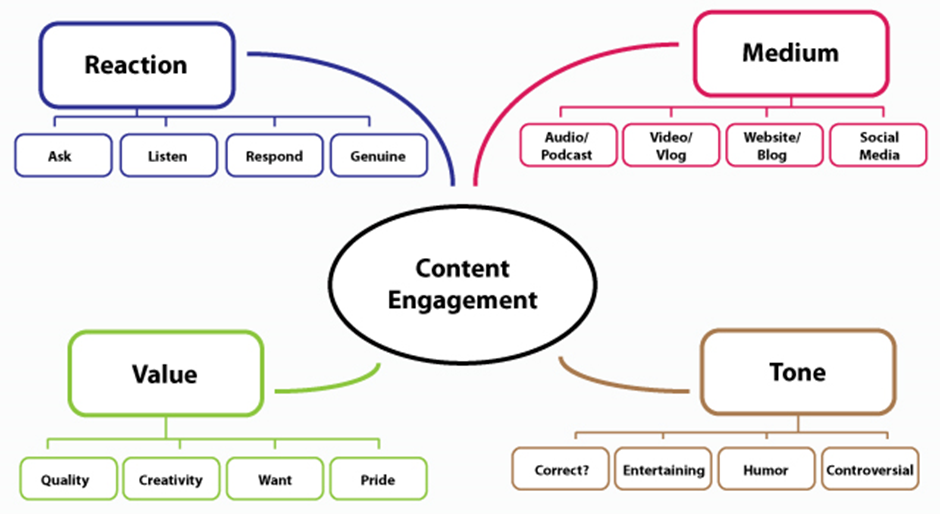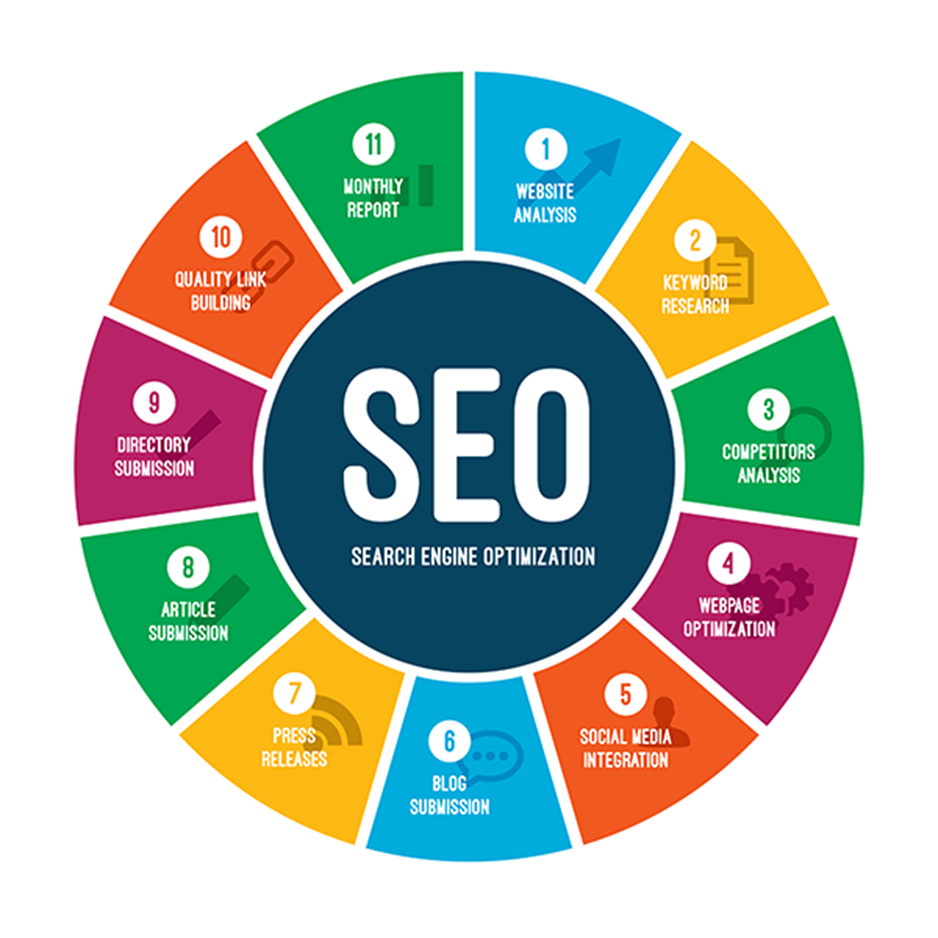
Table of Contents
- What Is Content Marketing?
- Why Is Content Marketing Important?
- 50 Content Marketing Terms to Be Aware of
- Key Takeaways
- Conclusion
- FAQs
Content production and distribution has been on a supersonic rise in most leading niches. But you can make the most of content only if you are aware of the top content marketing terms. Just like any other industry, content marketing comes with its own commonly used terms and jargon. If you have recently started to include content in your marketing plan, content marketing terminology may confuse you. It is when it becomes a must to be aware of the basic content marketing terms.
What Is Content Marketing?
Content marketing could be defined as a marketing method that emphasizes the creation, publishing, and sharing of content for a specific audience. It does not include heavily promoting a brand. Rather, it focuses on providing readers with valuable information, eventually converting them into leads and customers.

In content marketing, the focus is on stimulating readers’ interest in a brand’s products and services. Being aware of key content marketing terms can help brands make the most of their efforts.
Why Is Content Marketing Important?
An individual or business must include relevant and useful content at the core of their marketing strategies. Yes, it is a must these days. It is because it helps them attract and retain a pre-defined audience–letting them drive leads, engagements, and sales.
Content marketers are experts, who can create different types of content that is meaningful and can drive leads and sales.
Content marketing is good for the bottom line. Content creation done around most-searched keywords in your niche can boost your brand visibility and authority. In turn, you may pull qualified leads and turn your visitors into loyal customers.
If you want to move past your rivals online, you ought to include quality, compelling content in your marketing plan. And being aware of commonly used content marketing terms can help you stay ahead. Let’s take a look at why content matters to your business.
- Content helps you build your business.
- Content helps you increase quality traffic to your website.
- Content nurtures relationships.
50 Content Marketing Terms to Be Aware of
Whether you have recently started content marketing or have been doing it for a while, this list is created for you. Let’s take a quick look at some common content marketing glossary.
1. A/B Testing
A/B testing is the practice of comparing two variations of anything that lets you know which one is better. Publishing a blog with two titles to see which returns the most views is an example of A/B testing.
2. Analytics
Analytics is a common content marketing term that deals with the systematic review of statistics or data. Using analytics, you can know how many people click on your content and how they interact with it thereon.
3. Accessibility
Pages of a brand should be accessible or be able to be viewed by every visitor. They should be available on any type of device.
4. Action
Action is a content marketing term that denotes a user’s activity when they visit a website.
5. Ad space
Ad space is the spot on a page where ads get listed.
6. (Google) AdSense
AdSense is the advertising initiative of Google. As per your site’s content, targeted ads are picked. It is generally a revenue-generating program, and is quite popular.
7. (Google) AdWords (now Google Ads)
It is another advertising program of Google. It makes sure that ads that appear relate to the specific search queries of users.
8. Affiliate marketing
It is an ad model in which a brand pays others (bloggers, influencers, etc.) to advertise its services and products.
9. Aggregated content
It is content that is taken from diverse platforms and sources, and collated into a single piece.
10. Agile
Authoritative sites are agile, giving quick responses and updates on new events and opportunities.
11. Anchor text
It is another content marketing term and denotes the text used in any hyperlink. It is used by search engines like Google to rank and pull results.
12. Auto-blogging
Auto blogging means being able to post content that’s sourced from various RSS feeds.
13. B2B marketing
B2B marketing is business-to-business marketing. One business markets its products and services to another business.
14. B2C marketing
B2C marketing means business-to-consumer marketing. Under this, the services or products of a business are marketed to paying customers or the public.
15. Backlinks
Backlinks take a user to a page from an external website. Another term for backlinks is inbound or incoming links. It is a factor that search engines consider while ranking web pages.
16. Banner ads
These are ads embedded into the design of a website. They are determined by the search history of visitors.
17. Black hat SEO
Black hat SEO is a content marketing term that involves dishonest or unethical tricks deployed to crack search engine algorithms that decide site ranks. They can cause the marketer to pay hefty penalties.
18. Bounce rate
As soon as a reader lands on a page and abandons it for any reason, it is called a bounce. A higher bounce rate means that a site is not good enough to be explored.
19. Buyer’s journey
A person goes through many stages before becoming a loyal customer. This is known as a buyer’s journey.
20. Blog
A blog is an online journal that lets you publish content online. Blogs are mostly personal; but nowadays, you can find them being used by brands to promote their products.
21. Brand evangelist
A brand evangelist is a person who adores the product of a brand so much that they’re able to promote them to others. They’re more or less like brand advocates.
22. Buyer persona
Also known as a marketing persona, it is one of the leading content marketing terms. A buyer persona is a fictional and generalized version of what your audience is like. Once created, it helps you what type of content you should use and how you should market it. You will also know what topics to write about and the formats that will appeal most to your audience.
23. Content brief
A content brief is a document in which instructions or insights are given as to how to create content for a business.
24. Copywriting
Copywriting is a content marketing term that means writing online marketing copy or ads for a brand so that a user is convinced to buy its products.

25. Call-to-action
A call-to-action (CTA) is a commonly used content marketing term. It motivates a user to take action. A CTA tells people what they should do after having read your content.
26. Clickbait
Clickbait is content created with the sole purpose of getting people to ‘click’ on it. This content marketing term does not have a good reputation, because it over-promises and under-delivers.
27. Click-through rate
Click-through rate (CTR) is one of the frequently used content marketing terms. It denotes the ratio of people clicking on your content. The higher the CTR, the larger is the number of people finding your content worth reading.
28. Content strategy
A content strategy is the process of creating, publishing, and monitoring content.
29. Conversion
Conversion is a term that denotes whether a person has completed the desired action. Conversion could be a reader becoming a subscriber, a viewer buying your product, or a post being shared on social media platforms.
30. Content curation
Content curation involves sorting out tons and tons of content. It means streamlining content creation efforts and structuring the content in a precise manner.

31. Earned media
As the name suggests, earned media denotes free publicity. It refers to content that gets created by other people, in the form of reviews, testimonials, and more. It can also include shout-outs and positive comments on social media.
32. eBooks
eBooks are long-form content that contain information in a detailed manner. They are generally given for free in exchange for customers’ emails, in order to gather leads.
33. Evergreen content
Evergreen content always remains fresh and relevant. It is unaffected by changing times, and can be repurposed.
34. Engagement
Engagement is another crucial content marketing term that you will come across in the content space. It refers to the amount of attention your content is able to generate. It is usually in the form of likes, comments, and shares.

35. Flog
Flog is made up of two words: fake and blog. It is essentially an advertising stunt aimed at pushing a brand’s products or services on to unsuspecting visitors.
36. Hashtag
The hashtag is a creation of Twitter. It is used to index keywords on the social media platform. Brands also use popular hashtags, so that when a user searches for them, they can access their content, leading to engagement.
37. Influencer
An influencer is a person who can affect the way people behave. Content marketers work with influencers to promote their products and services. It leads to more engagement, leads, and patronage.
38. Infographic
An infographic is the visual representation of information and data. It can be in the form of a graph, chart, timeline, etc.
39. Interactive content
Interactive content engages your audience easily. Instead of asking anyone to read an article, this content type asks them to participate. The best examples are multimedia articles, surveys, and quizzes.
40. Key performance indicator
A key performance indicator (KPI) is a metric that a brand employs to know about its growth over time. A few KPIs include engagement rate, traffic volume, or the number of unique visitors.
41. Meme
A meme is a humorous take on an idea, trend, or concept that becomes viral over time. It can be in the form of cartoons, photographs, and video.
42. Newsjacking
It is the procedure of using the popularity of a story to advertise one’s products and push sales.
43. Owned media
Owned media consists of content that brands have full control over. It includes a business’ websites, blogs, catalogs, newsletters, and social handles.
44. Paid media
It is any type of content promotion for which a business pays.
45. Search engine optimization
Search engine optimization (SEO) is the practice of boosting website traffic with the use of organic search results. SEO majorly includes quality backlinks, strategic keywords, and other techniques to naturally boost the search ranking of any content type.

46. Search engine marketing
Search engine marketing (SEM) is a content marketing term that involves the usage of paid ads in search engine results. It leads to improved website traffic.
47. Social optimization
Social optimization means using social media to push awareness about a brand and connect with an audience.
48. Sponsored content
It is also called native advertising. Sponsored content is any content that businesses pay for, for promotion purposes.
49. User-generated content
This term means content created by the audience and not the company itself.
50. Visual content
Visual content is not text-oriented. It usually consists of infographics or images.
Key Takeaways
- Content is at the heart of the marketing strategies of many brands.
- Content marketing leads to better engagements, customer retention, leads, traffic, and sales. Any brand involved in content creation must be aware of the common content marketing terms.
- By referring to the above-mentioned content marketing glossary, you can become more aware of the industry and how it operates.
Conclusion
You are now well-versed with the standard content marketing terms. By knowing about these terms, you can craft content marketing strategies more confidently and effectively.

FAQs
Content marketing terms are words used in day-to-day content creation and related activities.
Educational blogs, ebooks, videos, and webinars are some of the best examples of content marketing.
They are: attraction, authority, affinity, and action.
It is the process of planning, writing, and editing web content.
Overall, it is a respectable career with decent yearly earnings.
Yes, you can take up freelancing stints as well as internships, when it comes to content writing.
Latest Blogs
Explore how Google’s 2025 AI search updates triggered ranking chaos. Learn actionable strategies to adapt your SEO for AI Overviews, zero-click searches, and SERP volatility. Stay ahead now.
Learn how to rank on AI search engines like ChatGPT, Perplexity, and Gemini by optimizing your content for authority, structure, and relevance. Stay ahead in AI-driven search with this strategic guide.
Explore the best healthcare SEO services for your medical practice. Improve online visibility and effectively reach more patients in need of your services.
Get your hands on the latest news!
Similar Posts

Content Marketing
4 mins read
11 Best B2B Content Marketing Agencies for B2B Companies in 2024

Content Marketing
5 mins read
Top ecommerce Marketing Agencies with Proven Strategies for 2024

Content Marketing
5 mins read